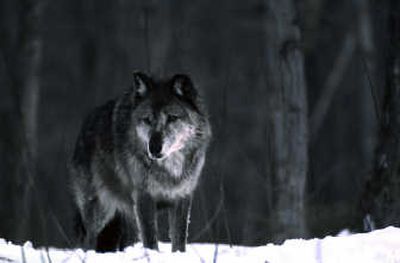Stevens County fears wolf cost

Washington’s wolf management plan hasn’t been released.
Already, Stevens County Commissioners and cattle ranchers don’t like it.
Fears that wolves will impact the county’s livestock and hunting industries have prompted county commissioners to suggest the state should pay the county $2 million to cover possible losses.
The Stevens County Cattlemen’s Association is sponsoring a forum Saturday with ranchers and outfitters from other states speaking about their experiences with wolves.
Stevens County cattle rancher Don Dashiell said “pro-wolf people” from the committee charged with developing the state’s plan on wolf management also have been invited to the meeting.
He wants them to explain “why we should welcome the wolf with open arms.”
“I guess if we’re going to dance with wolves,” he said, “I want to at least know who’s leading the dance.”
Anticipating the federal government’s delisting of the gray wolf as an endangered species, Washington and other Northwest states are developing plans to manage the wolf population.
Washington’s plan will be unveiled this summer.
While Idaho, Montana and Wyoming have significant wolf populations and are even proposing hunting seasons as early as this year, Washington has few confirmed wolf sightings and the species remains endangered and protected under state laws.
The state supports wolf recovery, said Madonna Luers, Department of Fish and Wildlife spokeswoman in Spokane. But Luers said there are no plans to reintroduce wolves into Washington.
Wolves are making their way on their own into Washington from other states and Canada, though. Numbers are expected to increase and so are tensions between wolves and humans.
“We haven’t had wolves in this state, for most people living here, in their lifetime,” Luers said. “To consider we may have them as they re-establish themselves naturally is fearful to some. I can understand that.”
The state’s management plan will address some of those fears, she said, and attempt to reduce the conflicts.
Stevens County Commissioner Tony Delgado said his county is one of the poorest in the state. He’s worried wolves will feast on livestock, without any recourse for ranchers.
Delgado’s also concerned hunting for deer, elk and moose could be curtailed as wolves take an increasing bite out of big-game populations.
“If we’re going to take a hit both ways like that just because the Endangered Species Act was written up the way it was and they don’t take the human economy into account, that’s really not fair,” Delgado said.
Washington’s draft wolf plan discusses the possibility of making changes to hunting seasons or limits to “provide adequate prey for wolves.”
Though the committee crafting Washington’s plan has discussed compensation for loss of livestock, Luers said there’s not been any discussion of compensating counties for loss of hunting revenue.
“Based on other states’ experiences, we don’t anticipate it will have the impact that is feared,” Luers said.
Idaho hunters had a record elk harvest during the most recent season, she noted.
Washington’s Wolf Working Group meets March 27-28 in Ellensburg to finalize details of the draft wolf plan, Luers said.
After scientific review, the plan will be released to the public for comment this summer.